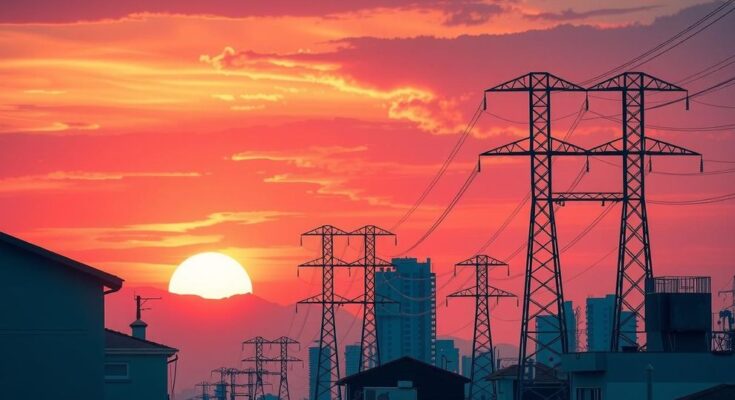Iraq is taking urgent measures to avert an impending electricity shortage due to the US ending its waiver on Iranian electricity imports. The country, heavily reliant on Iranian energy, is pushing forward key projects, including gas imports and investments in renewable energy, as part of its strategy for energy independence. Iraq’s Ministry of Electricity is actively working on operational plans to ensure a stable electricity supply in light of these recent sanctions.
Iraq is urgently advancing initiatives to address an expected electricity shortage this summer, particularly following the recent US decision to withdraw a waiver that allowed the country to purchase electricity from Iran, circumventing imposed sanctions. The waiver was rescinded as part of President Donald Trump’s “maximum pressure” strategy targeted at Tehran, aimed at mitigating Iran’s nuclear ambitions and its support for terrorism. The US Embassy in Baghdad emphasized the importance of Iraq moving away from reliance on Iranian energy sources.
Despite being the second-largest oil producer within OPEC, Iraq depends on Iran to satisfy approximately one-third of its electricity demands, importing 50 million cubic meters of gas daily and an additional 500 megawatts of electricity. In response to the US announcement, Iraqi Prime Minister Mohammed Shia Al Sudani convened a meeting to strategize on the electricity supply for the summer and ongoing developments concerning gas reserves.
Prime Minister Al Sudani emphasized accelerating several energy projects, including the establishment of connections between power stations and gas sources, along with the implementation of floating platforms to facilitate imported gas. Ahmed Moussa, spokesperson for the Iraqi Electricity Ministry, highlighted the importance of these floating platforms for enhancing gas imports from various countries, describing it as a significant achievement.
Furthermore, Minister of Electricity Ziad Ali Fadel presented a comprehensive plan for securing electricity supply and operational management for fuel stations. The Minister of Oil Hayan Abdul Ghani outlined strategies to ensure fuel supply for power plants, including quantities and the use of floating and mobile gas installations. Iraq is finalizing an agreement with Turkmenistan to import 20 million cubic meters of gas via a pipeline traversing Iran and has initiated the import of electricity from Jordan through a 340km line. The nation intends to connect to the Gulf Co-operation Council’s power grid by the end of this year.
In discussions regarding the implications of US sanctions on Iraq’s electricity sector, US Charge d’Affaires Daniel Rubinstein addressed the Financial Committee of the Iraqi Parliament, asserting that natural gas imports remain unaffected by the sanctions. Conversely, Iran’s Foreign Ministry condemned the termination of the sanctions waiver as “illegal,” labeling the actions of the US as unjustifiable and lacking legal foundation.
Baghdad has faced ongoing pressure from the US to diminish its reliance on Iranian energy imports, which have been constrained by US sanctions enacted since 2018. While Washington has extended temporary waivers to Iraq multiple times over recent years, the country is now striving to enhance its energy independence. Iraq’s natural gas reserves are estimated at approximately 3,714 billion cubic meters, with plans to develop these resources effectively. Collaborations with the Ukrainian company Ukrzemresurs promise increased production from the Akkas gas field.
Iraq has also established a $27 billion partnership with TotalEnergies to advance oil, gas, and renewable energy projects, alongside engaging in several other solar power initiatives. These efforts signify Iraq’s commitment to bolstering its energy infrastructure amid evolving challenges.
In conclusion, Iraq is proactively seeking solutions to counter the imminent electricity shortage exacerbated by the withdrawal of the US waiver on Iranian electricity imports. By advancing domestic gas production, pursuing international agreements, and enhancing energy diversification strategies, Iraq aims to achieve energy independence and reduce its dependency on Iranian sources. These initiatives reflect a commitment to developing a more secure and sustainable energy framework for the future.
Original Source: www.thenationalnews.com




